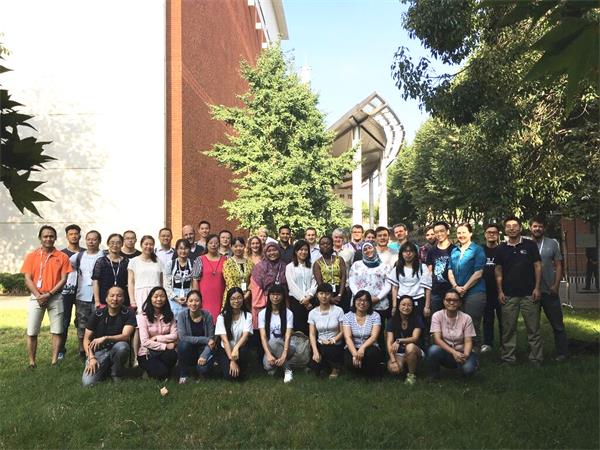We are pleased to announce the Yunnan Metabarcoding School, 2019 edition.
DNA metabarcoding is a rapidly evolving method of eukaryotic biodiversity assessment that combines two technologies: DNA taxonomy and high-throughput DNA sequencing. Applications range widely, from environmental impact assessment, to diet reconstruction, to paleoecology, to targeted species detection, among others. Metabarcoding draws from methods developed in field ecology, systematics and phylogenetics, molecular biology, bioinformatics, and statistics.
The 2019 Yunnan edition is allied to the metabarcoding school started by the metabarcoding.org team and shares some of the same instructors. This edition will be hosted by the Kunming Institute of Zoology and is financed by a special fund from the Chinese Academy of Sciences (CAS) focused on aspects of China’s Belt and Road Initiative (BRI). As such, the school will be preceded by a separate, one-day international conference to launch a Horizon Scanning exercise for the BRI.
The Yunnan Metabarcoding School will be held from 15 - 26 October 2019, in two sections.
14 Oct 2019: Belt and Road Initiative (BRI) Conference, Horizon Scanning
15-21 Oct 2019: Metabarcoding School I (MSI): Metabarcoding & Metagenomics
22-26 Oct 2019: Metabarcoding School II (MSII): R & Laboratory Practicals
The school will fund airfares, in-China ground travel, lodging, and meals for 30 students (including Ph.D. students, postdocs, and professional researchers, defined broadly). Students will be responsible for providing a suitable laptop computer (details below) and paying for their own out-of-China ground travel, tourist visa, and personal purchases.
MSI: Our goal is to host 15 students from within China and 15 students from other countries.
MSII: We expect approximately half the MSI students to stay on for MSII.
Application, selection criteria, and preparation
Candidates can apply for the school by sending an English-language email to the following address before 31 May 2019: metabarcoding_cas@mail.kiz.ac.cn
The email must contain the following in a single PDF attachment (no portrait photos):
1. a brief CV
2. a letter of motivation indicating how the applicant's research will benefit from DNA-based methods of biodiversity assessment (please first review the curriculum below, as we will cover both PCR-based and metagenomic methods). The core of the letter is a 150-200 word description of your research project. Please indicate if you wish to attend MSI or MSI and II.
In the (likely) case that we receive more than 30 applications (or more than 15 applications from outside China), preference will be given to students
1. whose described project in the cover letter is well developed and likely to benefit immediately from the skills learned,
2. who come from a Belt and Road Initiative (BRI) country
3. who are able to demonstrate basic fluency in molecular-ecology and bioinformatic techniques (e.g. can use Unix and R on the command line, can teach how PCR works)
4. who have sufficient English-language skills
Students must bring a laptop computer with the following capacity: ≥8 GB RAM, ≥150 GB SSD free storage, and natively boots into macOS or Ubuntu Linux.
We will assign preparatory homework to the accepted students.
Instructors
· Kristine Bohmann (Natural History Museum of Denmark)
· Frédéric Boyer (LECA, CNRS, France)
· Anthony Chariton (Macquarie University, Australia)
· Shyam Gopalakrishnan (Natural History Museum of Denmark)
· Min Tang (China Agricultural University)
· Shanlin Liu (China Agricultural University)
· Douglas Yu (Kunming Institute of Zoology; University of East Anglia, UK)
· Additional instructors from the Kunming Institute of Zoology
Curricula
The school will be divided into lectures and practicals, taught in English, with Chinese-fluent instructors present.
Metabarcoding School I: The lectures will cover different aspects of DNA metabarcoding and metagenomics as applied to eukaryotes. The obitools and DAMe practicals will let students run metabarcoding pipelines from raw sequences to species x sample tables, plus visualisations in R. The i/eDNA practical will introduce students to water sampling using filters. We will also run computer-based practicals in PCR primer design, taxonomic assignment, and metagenomic methods as applied to eukaryotic species (see Ji et al. 2019, Peel et al. 2019). Note that this course does not cover bacterial/archaeal/viral biodiversity.
All students will have to give a flash talk (7 mins) about their project and how it will benefit from DNA-based methods of biodiversity assessment. In the evenings, we will run a “Saw One, Did One, Now Teach One” exercise, in which students will divide into groups of three and teach each other the core lessons of the day. During mealtimes, we will readjust seating arrangements and ask small groups to describe their research projects to and ask questions of each other. In short, this course will use social interaction to aid learning and retention. Please prepare yourself accordingly. For one half-day, we will take a break and visit the local market and also take a Linden Centre class on preparing Chinese food.
1. The metabarcoding workflow
2. Primer design, test, and PCR optimisation
3. obitools metabarcoding pipeline I and II
4. DAMe metabarcoding pipeline I and II
5. Water sampling methods and i/eDNA
6. PCR and library prep options
7. Taxonomic assignment methods
8. Metagenomic approaches (e.g. mitogenomics, Reverse Metagenomics)
9. Research frontiers
Metabarcoding School II: To complement MSI, this course will teach the statistical analysis language R in computer-based practical sessions and will teach laboratory methods in practical sessions.
5 morning sessions covering:
1. General Linear Modelling (regression + ANOVA)
2. GLM (interactions, residuals analysis, ggplot2)
3. Community analysis (iNEXT, iNextPD, vegan)
4. Community analysis (NMDS, procrustes, permanova)
5. Community analysis (mvabund, boral, betapart, UpSet & Euler, Krona, metacoder)
5 afternoon sessions covering:
1. Sample collection, storage, and long-distance transport
2. DNA extraction & controls, quantification
3. PCR controls, setup, & purification, good lab practice
4. Library prep for Illumina sequencing
5. Student project advice workshop with instructors
Venues
Metabarcoding School I: The Linden Centre in Xizhou, Dali, Yunnan. We will travel by coach bus from Kunming to Xizhou. Most students will stay at the Linden Centre’s two educational buildings, with possible spillover to a nearby hotel, depending on room availability. Sleeping arrangements at the two Linden Centre buildings will be single-sex, four-person rooms with bunk beds. Classes will take place in the Linden Centre Yangzhouran building.
thelindencentre.blog/2018/11/03/the-linden-education-centre-yang-zhuo-rans-home/
www.linden-centre.com/accomodation-post/commons/
Metabarcoding School II: The Southwest Biodiversity Institute, Kunming, Yunnan. Students will be housed in a nearby hotel, in single-sex, two-person rooms.
We anticipate being able to accommodate all dietary preferences, including vegetarians, vegans, and strict fungivores and insectivores.
Travel
Students will be responsible for booking and first paying for their own flights, and we will reimburse in cash in China. Students will also be responsible for paying tourist-visa fees and out-of-China ground travel costs. Flights should be to Kunming Changshui International Airport (airport code: KMG). We recommend arriving on Sunday 13 October, which will allow you to get over jet lag and also to attend the allied BRI conference on 14 October. Students attending only MSI can leave starting 22 Oct. Students attending MSII can leave starting evening of 26 Oct. Note that internet access to Google services, including gmail, is restricted in China.
Behaviour
We will operate a zero-tolerance policy toward sexual and other forms of harassment, and students will be required to sign a pledge of conduct at the beginning of the class.
References
Peel, N., Dicks, L.V., Clark, M.D., Heavens, D., Percival-Alwyn, L., Cooper, C., Davies, R.G., Leggett, R.M., Yu, D.W. (2019) Semi-quantitative characterisation of mixed pollen samples using MinION sequencing and Reverse Metagenomics (RevMet). bioRXiv: https://doi.org/10.1101/551960
Ji, Y.Q., Huotari, T., Roslin, T., Schmidt, N.M., Wang, J.X., Yu, D.W., Ovaskainen, O. (2019) SPIKEPIPE: A metagenomic pipeline for the accurate quantification of eukaryotic species occurrences and abundances using DNA barcodes or mitogenomes. bioRXiv: https://doi.org/10.1101/533737

The group photo of 2016 Metabarcoding school (China)

2019 Metabarcoding school venues: The Linden Education centre
